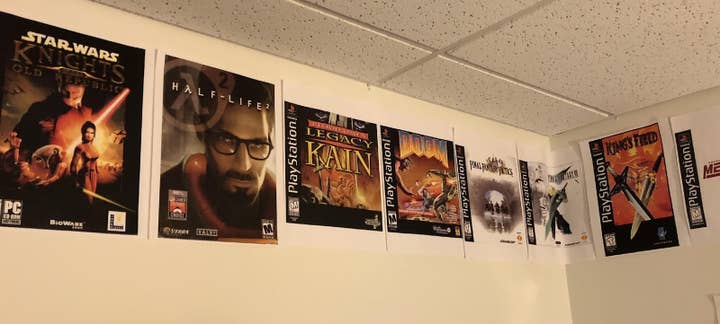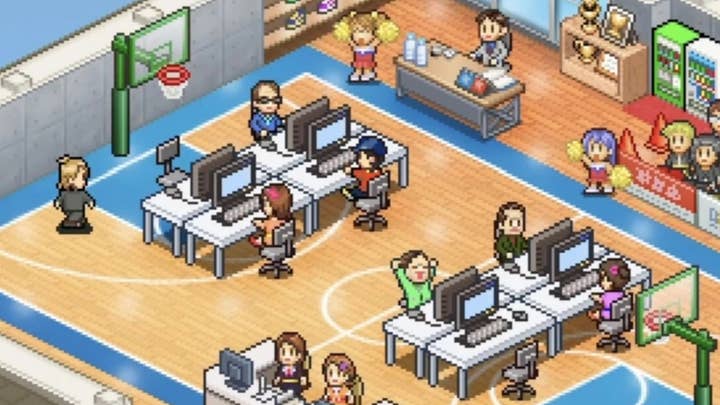Why I Love the Game Industry (an Ode to "The Last Lecture")
Longtime Firaxis producer Garth DeAngelis applies the lessons of Randy Pausch's farewell address to a career in games
When I first saw the GamesIndustry.biz open call for developer testimonials on the video games they adore, I felt a wash of hope. Here was an opportunity for recurring positivity, simply stories about how the folks creating games today originally fell in love with what they now do for a living.
Oftentimes, despite working in an industry I love, I feel like I'm balancing on a high-wire with no net below. Industry news features headlines in flashing neon about studio closures and layoffs, the predatory nature of perpetual crunch, the toxicity of online communities, and horrific accounts of discrimination and harassment. The truth is, game industry news is often bleak. So, a recurring feature that would remind me why I'm here? Sign me up.
My office is plastered with a personal "Wall of Games" from my most impressionable years. I could pick any one of them and write an article on "Why I Love" the experience it offered.

But instead of deep diving on one game, it felt like the industry as a whole could use a reminder as to why it's so special and deserving of our continued dedication. After all, your own gaming love story is probably why you're here right now. Here's mine.
Fifteen years ago, I witnessed the speech that would inspire me to dedicate my career to enabling creativity.
But a few months before seeing that speech, in the summer of 2007, I was terrified for my future. I made a high-risk career change, abandoning a secure and stable path for one of uncertainty. I was a soon-to-be engaged man with family depending on me, and I was asking those that I loved most to blindly trust in my pursuit of more creative (or, volatile) pastures. It was scary. I wasn't sure this personal gamble would work. Yet, I had to go for it.
This was the moment I stepped out onto that aforementioned high-wire (and I owe everything to my wife who not only came for the ride, but encouraged me to pursue my dream).
My career transition started after being accepted into Carnegie Mellon University's Entertainment Technology Center graduate degree program. I jumped from the banking industry, dining with high net-worth clients and discussing retirement plans to instead learning the importance of source control and how to texture UVs in Photoshop. Simultaneously excited but knee-deep in self-doubt, my leap of faith became validated on September 18th, 2007 when professor Randy Pausch delivered his "Last Lecture" to the faculty and student body.
The Last Lecture series is a Carnegie Mellon tradition for tenured professors, challenging them to create a speech for the student body as if it were their last. But in this case, it really was the final lecture for Randy, who had been diagnosed with pancreatic cancer and had months to live. Unbeknownst to me and the rest of campus, this lecture would touch and uplift a global footprint much larger than the 500-capacity auditorium that Randy initially gobsmacked, eventually garnering tens of millions of views on YouTube and becoming a New York Times bestselling book (not to mention, he was interviewed by Oprah. OPRAH!).
If you somehow missed Randy's speech, please stop reading this, bring your lunch to your desk, and take the time to watch what I refer to as the "Best Hour on the Internet" (or, ask him a question for yourself in the recently finished CMU website). His words are a beacon of light in an otherwise murky and often pessimistic online world. Taking in Randy's experiences may bring your entire career mindset (and life) to a measurably more positive and productive place. At the very least, you will be moved.
Randy's wisdom, courage and earnestness is so pure, I feel deeply inadequate to write about it. But, this column is an expression of Why I Love the Game Industry, and to tackle that topic, I couldn't think of a better launching point than honoring the 15-year anniversary of Randy's Last Lecture. His lessons continue to be the foundation for how I operate, and how I do my best to serve talented teams and game audiences. His zest for life, fun and dream fulfillment feel wholly appropriate for an industry that thrives on what he strived for… making magic.
"Really Achieving Your Childhood Dreams"
For me and countless others, working in the game industry is the culmination of achieving a childhood dream. Like Randy's aspirations to feel zero gravity and win enormous stuffed animals, my dreams were pretty fluid and silly (NBA player! Rock star!), but one thing remained constant throughout my life: a deep connection with the interactive medium of video games.
Like so many Xennials, profound seeds were planted through the novelty of digital play in my youth. My personal gaming timeline acted as a sort of wonder-producing printing press for new experiences, cultivating emotions and curiosity within me that may have otherwise been muted.
I experienced how a rigid game of chess could burst to life in Archon, teaching me the possibilities of blending seemingly diametrically opposed systems (turn-based and real-time). I would blaze down the highway, expertly avoiding fenders and spiked clubs in Road Rash, allowing me a safe thrill beyond the comparatively tame real world Harley Davidson rides from dad. Games allowed me to manage my first sports franchise in Hardball!, proactively running a lineup instead of just reading the box scores in the morning sports section. And I entered a nightmarish world of a vampire in Blood Omen: Legacy of Kain, tapping into a fascination with dark storytelling and challenging gameplay that sunk its fangs deep within me.
For some reason, these experiences became entrenched, the emotions they spurred inscribed in my memory forever. To me, they were never fleeting.
"Never lose your sense of childlike wonder."
When Randy spouts the virtues of maintaining a childlike wonder (and speculative science posits it may go beyond superficial benefits), video game platforms were my means to keep that magic alive. Looking back, it was equally important to experience childhood rites of passage like the heated neighborhood football rivalries and forays into the unknown woods, but video games have been able to grow with me.
The majority of my friends, while thinking my profession is "cool," simultaneously infer games don't belong in their adult life, as if an adulthood prerequisite is the abandonment of games. But these aren't mutually exclusive. While I play for enjoyment less than when I was a kid, actual game development on a daily basis is the part of my life that helps me keep that childlike wonder alive, by witnessing or enabling fellow developers to craft new designs and content at an amazing clip.
"Do something you love. Never stop having fun."
As stated earlier, I worked as a banker for seven years. I had a good career, I worked hard, and I was receiving great advancement opportunities. And I disliked almost everything about it.
While I could have easily built a lifelong, stable career in banking, the childlike voice in my head would often ask me one simple question: "Are you having fun?"
Selecting a career is such a complex, multifaceted problem. It's natural to prioritize earnings, security, philanthropy, work/life balance, or something else entirely. Many make the decision purely a pragmatic one, and never consider the importance of finding something that makes you excited to spend 40-plus hours a week doing.
Similar to Randy's notion on karma taking care of itself, I always felt those adult living necessities would come to you if you simply went after what made you hungry, and excelled at it. I never knew exactly what I wanted to be, but I did always know that I wanted to feel something with respect to my career, something that was going to consume most of my waking hours. And I have that in spades in game development, starting with the insanely talented individuals I've had the pleasure to work with.
"You can't get there alone."
I knew I loved playing games. But that didn't necessarily mean I'd love making them. Making games is a mind-bogglingly complex task, technically and creatively. On top of that, the individuals that construct the product often speak different languages of craft, as well as having different agendas. Understanding the needs of all creatives, and helping to direct to a place of unity and most importantly, quality, is something I love shepherding.
In order to lead to that place of quality, you need the trust of your peers, or else goals and words will become meaningless. Earning trust is paramount, but Randy touched on some simple keys that will help you get there, ultimately keeping you and your team engaged: "Tell the truth, always; Be earnest; Apologize when you screw up; Focus on others". Who would've thought such simple rules would lead to a healthy, sustainable culture?
With trust intact, then the love can flow. The team can begin pure discoverability through collaboration, spit-balling, experimentation, and failing (quickly), all to ultimately find that breakthrough, that magic. And I love the interdependency amongst all game dev wizards to make each other better.
Without a programmer, the design is simply a cool concept on paper. Without a modeler, the gameplay is without an anchor for the player. Without an animator, the model is without soul. Without effects, the animation lacks spectacle. Without audio, the user won't be swept off to a new dimension. Without design, writing, concept, cohesive UX, and more, there is no overarching template to bring everything together, to bring the magic to life.
And to then feel it through play and interactivity! To create new novel experiences and mechanics that spur emotion! That's why I changed careers. To feel, to create something from nothing, and to be there for a team that I'm passionate about working with.
"Enabling the dreams of others."
Empowering others to make magic is what drove so much of Randy's passion, and it's why I love the video game industry. There are things that must be improved, and they should be thoroughly discussed. But don't forget why you're here. Don't forget your personal love story, your most impressionable years, and the sheer joy it contributed to your life. Because the onus is now on us to gift even more inspiring worlds to the kids that are dreaming now.
